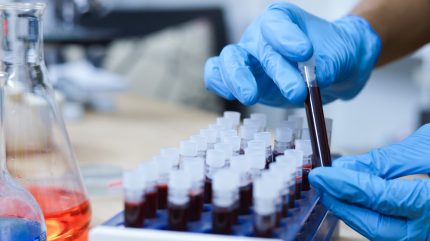
Two blood cancer treatments will now be available on the UK’s National Health Service (NHS) following recommendations from the National Institute for Health and Care Excellence (NICE).
In final guidance published on 20 February, NICE has endorsed Bristol Myers Squibb’s (BMS’) Breyanzi (lisocabtagene maraleucel) for adults with large B-cell lymphoma whose cancer has either not responded to initial treatment or relapsed within 12 months. The decision makes Breyanzi the first chimeric antigen receptor T (CAR T)-cell therapy recommended for this specific indication in England.

Discover B2B Marketing That Performs
Combine business intelligence and editorial excellence to reach engaged professionals across 36 leading media platforms.
NICE estimates that around 600 patients per year will be eligible for the treatment, which is intended for patients with diffuse large B-cell lymphoma, high-grade B-cell lymphoma, primary mediastinal large B-cell lymphoma, and grade 3B follicular lymphoma, provided they are candidates for a bone marrow transplant.
The recommendation follows an earlier draft decision in October 2024 in which NICE had deemed Breyanzi was not cost-effective. However, the institute reversed its stance after BMS proposed an improved commercial arrangement for the therapy, which has a list price of £297,000 per patient. While details of the new pricing agreement remain confidential, it enabled the treatment to meet NICE’s cost-effectiveness criteria for NHS use.
Blood Cancer UK has welcomed the decision, with the charity’s policy officer Josh Hill saying: “Many of the existing treatments are extremely toxic to human cells, so we welcome this decision, which means there are more treatment options for people with blood cancer in England.”
Separately, NICE has also recommended the use of Blincyto (blinatumomab), a bispecific T-cell engager (BiTE) therapy from Amgen. The treatment is for adults with CD19-positive B-cell precursor acute lymphoblastic leukaemia (B-ALL) who are in first or second complete remission but have minimal residual disease (MRD).

US Tariffs are shifting - will you react or anticipate?
Don’t let policy changes catch you off guard. Stay proactive with real-time data and expert analysis.
By GlobalDataMRD-positive patients have detectable cancer cells despite being in remission and are at higher risk of relapse.
According to Leukaemia Care, up to 90% of frontline adult patients will achieve an initial haematologic complete response (CR), but up to 50% of patients will experience relapse and need a second line of therapy. Most relapses happen within two years of initial treatment, though they can occur months or even years later.
Blincyto, which will be made available immediately on the NHS, is expected to benefit around 80 adults annually. The recommendation follows a label expansion from the US Food and Drug Administration (FDA) in June 2024 that included its use in the consolidation phase for patients with CD19-positive Philadelphia chromosome-negative B-ALL.
In September 2024, Blood Cancer UK released a UK action plan report. The report stated that the UK lags behind nations of similar wealth and health when it comes to survival rates for blood cancer, as well as highlighting the life-limiting side effects of current treatments. In December 2024, the government in England said it would publish a national cancer plan, as recommended by the Health and Social Care Committee. Earlier this month, the committee opened a call for evidence from experts to shape the plan.
According to GlobalData’s Pharma Intelligence Center, Breyanzi and Blincyto are forecast to generate $2.7bn and $1.97bn in sales by 2030, respectively.
GlobalData is the parent company of Pharmaceutical Technology.




